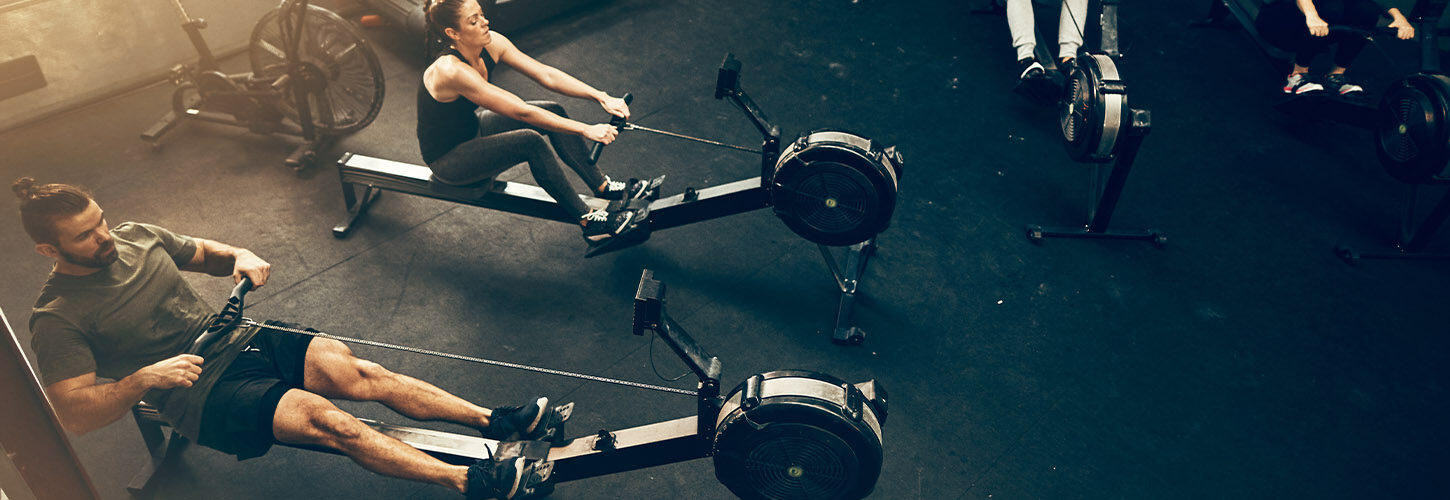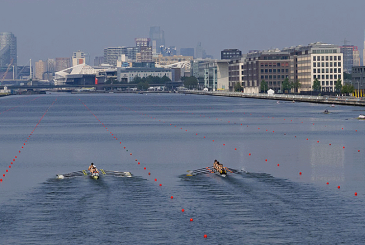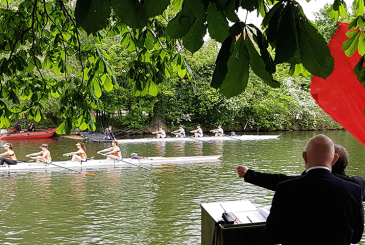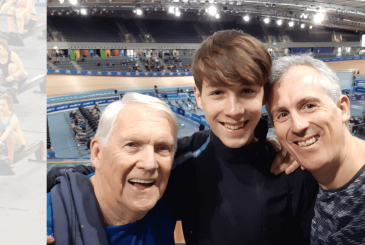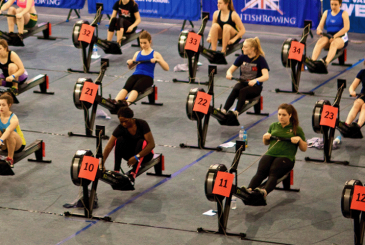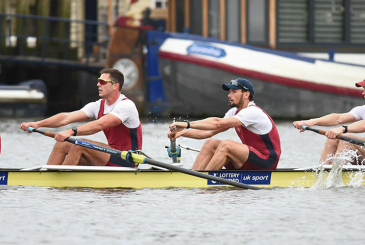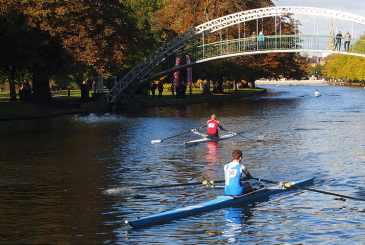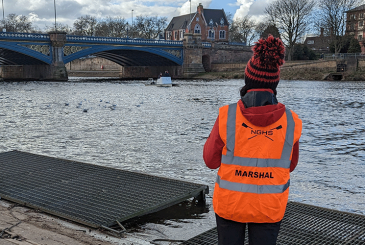Jade Lally has spent the past twenty years training and competing in athletics, specifically discus. Recent encouragement from a friend, fellow athlete and BR+ author Chris Scott, to try indoor rowing has led Jade to become a British and World Record holder. Here she shares some insights into how her mindset and training for discus has helped her performance on the indoor rowing machine
As a discus thrower, the cornerstone of my success stems from strength, muscular endurance and plyometric power. However, aerobic fitness offers an additional foundation for consistency and quicker recovery between throws; yet it has never been a favourite feature in any of my training cycles (and to date, this remains unchanged!). In 2020, a friend and fellow athlete, Chris Scott, encouraged me to try indoor rowing: his own success a promising factor. A simple 500m attempt at my local gym, followed by the discovery of the Concept2 Logbook and Rankings and my competitive spirit was truly inspired, even if my lungs still burnt and my chest still heaved at every subsequent attempt!
Whilst the tactical elements and race preparation are enormously different…the mindset, competitive drive and dedication to continuous improvement are very much common elements…
2021
In October, I entered my first competition: the Australian National Championships. Competing at the local rowing club, I was immediately intimidated by the breadth and depth of preparation that ‘true’ rowers brought to the competition. Despite my amateur status, I was able to set a new personal best, win the competition and set a new 500m British Record (1:28.6). I learnt an incredible amount about indoor rowing, least of which is how arduous sprint racing is: 500m is without doubt my maximum effort/distance. Whilst the tactical elements of indoor rowing and race preparation are enormously different to my approaches in athletics competitions, the mindset, competitive drive and dedication to continuous improvement are very much common elements. It was this competitive drive, the need to improve on mistakes, that saw me compete in the British Championships (one minute time trial) in December 2021 – another PB, Championship title and British Record (355m).
With very little variation throughout each training cycle I am afforded consistency in training and the ability to drive continuous improvement in my form, function and performance.
Despite these successes there have been many shortcomings. My ‘race plan’ for the Australian Championships fell apart in the opening strokes and I was forced into a ‘fly or die’ approach. I realised some improvements in race planning during the British Championships yet once again fatigue and exhaustion leg to amateurish mistakes, costing me what could have been a World Record.
So, with such little experience and the many shortcomings I have experienced, I have had to ask myself ‘how is it that I am doing so well?’ I honestly believe that my background as a power-based athlete gives me the ability to excel in short distance sprints. Most of my strength based training is specifically geared towards discus and in addition to my sport specific training sessions I am in the gym four times per week doing Olympic lifting, bench press, pull ups, squats and lunge variations (see statistics below). With very little variation throughout each training cycle I am afforded consistency in training and the ability to drive continuous improvement in my form, function and performance. I firmly believe that it is the confidence in my strength and power that has enabled me to achieve positive results in indoor rowing short sprints, and perhaps the only edge I had against competitors for both of my races.
Strength stats
| Hang Clean | 110kg (at 88kg bodyweight) |
| Hip Snatch | 80kg |
| Bench Press | 110kg (bounce bench with pad) |
| Back Squat | 135kg |
| Standing Long Jump | 2.88m |
| Box Jump | 105cm |
2022
I hope to compete in my fourth Commonwealth Games, second World Athletics Championships, third European Athletics Championships, and first Indoor Rowing World Championships. With such a packed calendar, competition preparation, scheduling and tapering will become significant milestones. So how do I do it?
Approaching the competition
I aim to have my training cycle zenith at reduced volume with increased intensity, technical form and power transfer (whether this is strength training, throwing training or indeed rowing). This aids me in maintaining a balanced Central Nervous System, and helps me peak as fresh, strong and reactive going into a competition. I will, of course, confer with coaches and mentors to ensure I have a sound strategy based on my performance leading up to a competition and assists in visualising how the event/race is likely to pan out.
The day of the competition
The day is as controlled and deliberate as I can manage. I will aim to have a nice medium rare steak dinner the night before and (nerves notwithstanding) try to get eight hours sleep, or have a short nap if the event is late afternoon or evening. Fresh and wholesome foods are the normal fare throughout the day with a couple of extra carbohydrate based snacks (especially for the longer throwing events). Tactically, I will be much more focused on the conditions for the event (in discus: how to approach warm up throws, what shoes best suit the circle, what discus is best suited for the weather conditions. In rowing: locking down a strong start with four to five long pulls, what pace I need to set, what stroke rate I need for power and speed, and checking with my coxswain that key milestones and catchwords they will need to use during the race).
The event itself
When it comes to the event itself, I enjoy and encourage the feeling of nervousness. I thrive on the adrenaline rush and have practiced using it to fuel my focus and performance. I keep a positive mood by listening to some upbeat, lifting music: if it puts a smile on my face it works, there is no set playlist. Finally, it is about tuning into the ‘feeling’ of each movement (discus or rowing) so I know *exactly* when to put the power down. There exists a huge divergence in the mindset during competition/ races for discus and rowing (simply because of the nature of each event: one staged and protracted, the other short, sharp and intensely painful), but the one common driving factor is a focus on moving forward, and targeting the next competitor ahead of me.
Post-competition
Post-competition recovery has never been a huge factor for me, but that is not to say rest and recovery does not happen. On the contrary, recovery is a deliberate and planned activity throughout the year: whether that is a remedial massage, infrared sauna, cryotherapy, good old-fashioned rest, or other allied health support is tailored to ensure I maintain peak performance, reduce the risk of injury and am ready for the next training session.
I am not a rower…yet, but I am an elite athlete, and so, if I could offer any advice to people looking to be part of a competitive sport, such as indoor rowing, I would say:
Embrace it all. The big names. The big moment. The formality. The new rules, new competitors. Embrace it all. I enjoy being part of an elite group, so making a Championship of any sort, means I have made it.


